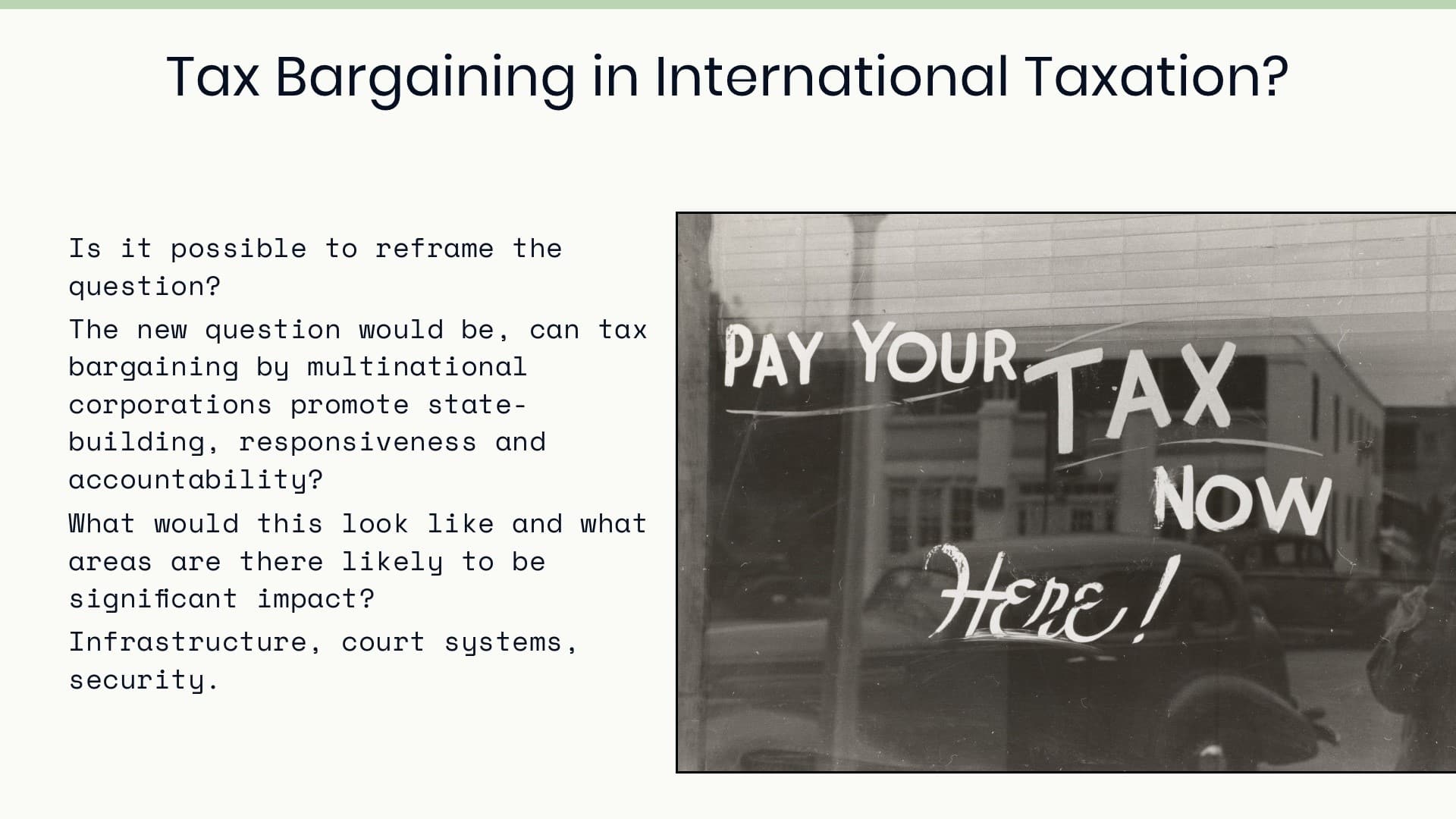Is it Unjust for Multinational Corporations to Pay Taxes to Corrupt Regimes?
22 Jun 2021|
- Research
International taxation is arguably one of the hottest topics in global politics at the moment. In the midst of a global pandemic, last week’s announcement that the Group of 7 countries (commonly known as the G7) would back a global minimum corporate tax rate managed to divert attention from the Covid crisis and dominated the news headlines for a few days. Similarly, the concerns regarding unfair tax treaties between developed and developing countries and, relatedly, the practices governing how much taxes multinational corporations pay in developing countries, have taken centre stage in work undertaken by tax academics and policymakers globally in the last few decades.
Tax Treaties
Unlike international trade law or international human rights law, where countries have ratified multilateral treaties that govern specific aspects of their interactions in these areas of the law, there is no multilateral tax treaty, in the strict sense, whose provisions binds all states. Tax remains a matter for states to control based on their sovereignty. However, due to the proliferation of multinational corporations and the unprecedented increase in cross-border trade, states have been forced to cooperate to resolve instances where two countries lay claim on the right to tax the same income. To prevent the taxpayer from double taxation, states sometimes enter into bilateral double tax treaties to specify which country has the right to tax particular income when applying the domestic rules of both states leads to such conflict.
Double tax treaties are modelled on international tax rules developed in the 20th century when the global economy was very different, and it is now widely acknowledged that those rules are no longer fit for purpose. For instance, the rules were developed while many developing countries in Africa were still under colonial rule and before the advent of digital business. Predictably, these changes in global politics and economics, without simultaneous changes in global taxing rules, has created significant problems. Tax remains an area where states very much want to exert their sovereignty and maximise the tax revenue they can collect. There is little political will to bring about radical reform. Thus, the rules determining which country gets to tax still primarily benefit net capital-exporting countries.
Tax scholars working on global justice and taxation argue that the unfairness in the rules governing the allocation of ‘taxing rights’ between developed and developing countries is a global justice issue. This proposition has been met with various counterarguments. One such counterargument is that it is unjust and irresponsible, and perhaps unnecessary, to spend the time and effort required to increase the amount of taxes paid to a developing country ruled by a corrupt regime. I first heard this counterargument raised at a conference in Vienna by a Partner at a law firm whose clients are High Net-worth Individuals who presumably lose much sleep over the thought of aiding and abetting corrupt regimes through taxes on their income. The gentlemen went as far as to passionately argue that the collection of taxes from the wealthy by corrupt governments was a human rights issue. I suspect that these individuals lose sleep over the thought of paying taxes in general, but I shall stick to the assignment at hand and interrogate this concern. So, is it unjust for multinational corporations to pay taxes to corrupt regimes?

Who Lives, Who Dies, Who Tells the Story
The first problem with this question is a normative one; an ‘ought’ problem. Should we be asking this question at all? The finale song of the musical Hamilton, based on the life of Alexander Hamilton, reminds us that when we have no power to tell our story, our worth, destiny, and story will be determined by people and events over which we have no agency. The powerholder tells the story. Similarly, in international taxation, the players who have less power have less opportunity to determine their worth and story; the story is primarily, although not exclusively, written by those who hold power- in this case, multinational corporation and net capital-exporting countries who benefit most from international tax rules.
Should power holders, over whom weaker players have little or sometimes no agency, set the rules regarding the worth of countries by determining whose regimes are ‘good enough’ to collect taxes? If corruption is heat, who holds the thermometer and takes the reading? Are there states or global institutions that are objective enough to read the thermometer and determine who are the good boys and girls and who has been naughty? Is corruption domiciled only in developing countries? Is there no corruption in other countries? Do developing countries have the power to hold the thermometer and take the corruption reading in developed countries? Who holds the thermometer? Who sets the thresholds? Who asks the questions? Who tells the story?

Are we Asking the Right Question?
Going beyond the normative question, however, I argue that we can reframe this question in more positive terms and possibly get a more helpful answer. For many years now, scholars in politics and development, writing on domestic taxation, have argued that tax bargaining between citizens and governments over tax revenue collection can have significant positive effects on governance. They demonstrate in their research that efforts by governments to expand the tax revenue they collect can often result in a push by citizens for reciprocal service provision and expanded accountability. Pritchard, particularly, has provided credible empirical evidence from Ghana, Kenya and Ethiopia showing that tax bargaining can indeed provide a critical foundation for the development of responsible and accountable governance.
I see here the potential to explore whether tax bargaining in international taxation can produce similar results. I conclude this piece by reframing the question in the title in this way: can tax bargaining between multinational corporations and countries with corrupt regimes promote state-building, responsiveness, and accountability in governance? How would this sort of bargaining look, and what contextual factors would shape the potential for it? What aspects of state-building and governance would benefit most from such bargaining, and how would we measure such an effect? I do not have the answers, but it is certainly worth the effort to try and find them.
Category: Research